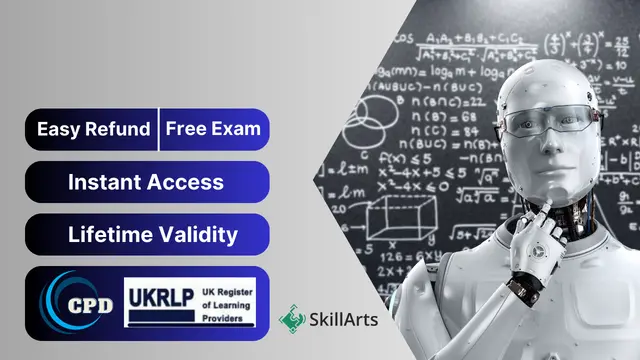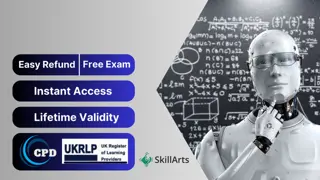
Python for Data Science and Machine Learning from A-Z
Win Complementary PDF Certificate on Machine Learning & Get Unlimited Tutor Support
Skill Arts
Summary
- Reed Courses Certificate of Completion - Free
- Tutor is available to students
Add to basket or enquire
Overview
This Python for Data Science and Machine Learning from A-Z Course is designed to provide you with knowledge to ensure a high standard of learning about Machine Learning. The course is crafted specially for distance learning. We divided our courses into smaller easily digestible modules, so that you can maintain attention throughout the course. SkillArts is duty bound to provide you with top level elearning, produced and maintained by industry experts.
Learning Outcome of this Python for Data Science and Machine Learning Course:
- Acquire the skill to clean, process, wrangle, and manipulate data with Machine Learning tools.
- Understand how to craft a CV suitable for a Machine Learning-focused data science role.
- Grasp the nuances of NumPy for numerical data in the context of Machine Learning.
- Delve into the intricacies of various Python libraries, like Pandas, Matplotlib, SciPy, and others, for Machine Learning applications.
- Navigate through key Machine Learning concepts and algorithms.
- Learn to devise bespoke data solutions using Machine Learning.
Certificates
Reed Courses Certificate of Completion
Digital certificate - Included
Will be downloadable when all lectures have been completed.
Curriculum
-
Python for Data Science and Machine Learning: Course Intro 1:11:56
-
Data Science & Machine Learning Concepts 1:06:35
-
Python For Data Science 2:51:38
-
Statistics for Data Science 58:30
-
Probability and Hypothesis Testing 20:46
-
NumPy Data Analysis 52:30
-
Pandas Data Analysis 33:57
-
Python Data Visualization 37:37
-
Introduction to Machine Learning 26:03
-
Data Loading & Exploration 13:05
-
Data Cleaning 15:23
-
Feature Selecting and Engineering 06:11
-
Linear and Logistic Regression 49:16
-
K Nearest Neighbours 1:36:41
-
Decision Trees 2:29:39
-
Ensemble Learning and Random Forests 14:16
-
Support Vector Machines 1:28:58
-
K-Means 1:00:15
-
PCA 2:00:12
-
Data Science Career 36:09
-
Python for Data Science & Machine Learning: Final Exam 03:00
Course media
Description
Embark on a comprehensive journey into the world of data science and machine learning with our course, "Python for Data Science and Machine Learning from A-Z." Master the art of using Python for data analysis, as well as statistics and probability essential for data science. Delve into hypothesis testing and gain insights into interpreting results. Explore NumPy and Pandas libraries for in-depth data analysis and manipulation. Uncover the power of Python data visualization to effectively communicate insights. Our expert-led program equips you with essential techniques to excel in machine learning.
The Machine Learning Online Course is an industrial standard e-learning course. We've separated the course into multiple easily digestible modules, covering all essential elements of Machine Learning. Is there anything else included in this Machine Learning course package?
- We're a UK-based Training Provider accredited by CPD Group and registered with UKRLP.
- Study at your own pace from any device in our modern learning environment.
- Our exams test your knowledge and help you refine your skills on Machine Learning.
- You can get the PDF certificates from this Machine Learning for free!
- Most importantly, we will aid you in adapting to the updated industry compliance and practices regarding Machine Learning.
- Support is available for any questions you might have regarding any course content, not just Machine Learning.
Enrol now to immerse yourself in the world of impactful "Machine Learning." Don't miss this opportunity to become a machine learning expert through our comprehensive course. Join us to unlock your potential for harnessing Python's prowess for data science, predictive analysis, and informed decision-making that drives innovation.
There are no hidden fees, no sudden exam charges, and no other kind of unexpected payments.
Who is this course for?
The purpose of this Machine Learning is to assist learners in moving forward in their personal and professional lives.
Requirements
This Machine Learning Training does not have any prerequisites or formal requirements.
Career path
This Machine Learning Masterclass can help you excel in your career in various ways.
Questions and answers
Currently there are no Q&As for this course. Be the first to ask a question.
Reviews
Currently there are no reviews for this course. Be the first to leave a review.
Legal information
This course is advertised on reed.co.uk by the Course Provider, whose terms and conditions apply. Purchases are made directly from the Course Provider, and as such, content and materials are supplied by the Course Provider directly. Reed is acting as agent and not reseller in relation to this course. Reed's only responsibility is to facilitate your payment for the course. It is your responsibility to review and agree to the Course Provider's terms and conditions and satisfy yourself as to the suitability of the course you intend to purchase. Reed will not have any responsibility for the content of the course and/or associated materials.


